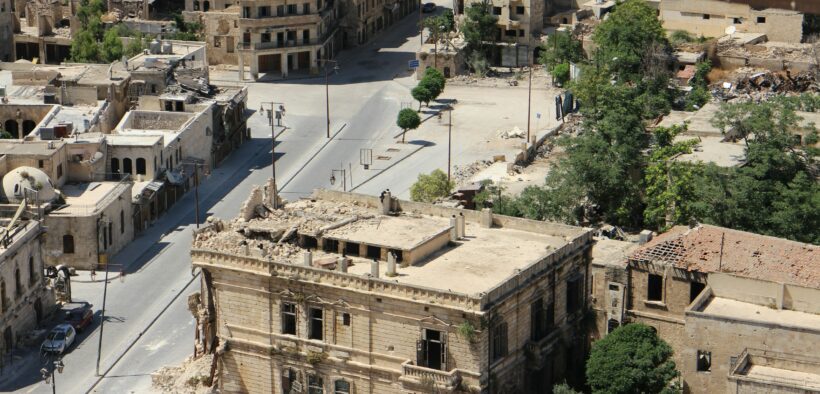“Canada and the Netherlands vs. Syria”: The Future of the Syrian Civil War
Share

Image Credits: @soriaty on Unsplash (Unsplash License)
Canada and the Netherlands vs. Syria
As of June 2023, Canada and the Netherlands filed a joint application to the International Court of Justice (ICJ) to bring a case against the Syrian government under President Bashar al-Assad. In the case of Canada and the Netherlands vs. Syria, the Syrian government is accused of violating international humanitarian and customary law and the 1984 United Nations Convention Against Torture. This case not only adjudicates the abusive federal powers of the Syrian government but also implicates a crucial step in solving the ongoing Syrian refugee diaspora throughout Europe that stems from the Syrian Civil War conflict in which President al-Assad’s government is heavily involved. If the petition is accepted by the International Court, Canada and the Netherlands expect a ruling that takes action against his regime. German authorities set the precedent for this case before applying to the International Court of Justice. The first trial worldwide on state torture in Syria was in April 2020 at the Higher Regional Court in Koblenz, Germany. In this case, the German Federal Prosecutors were indicting two former officials of President al-Assad’s Syrian General Intelligence Directorate, Anwar R. and Eyad A. President al-Assad’s government was accused of being responsible for numerous war crimes and crimes against humanity, especially for the systematic torture of political dissidents and activists.
What is Happening in Syria?
In 2000, Bashar al-Assad succeeded his father, Hafez al-Assad, as the President of Syria. His tenure as president resulted in years of high unemployment, corruption, and lack of political freedom. President al-Assad belonged to the Baath Party. This pro-Arab group conflicted with pro-Islamic groups, specifically, a coalition of militant forces called the Hayat Tahrir al-Sham (HTS), located in northwest Syria. In 2011, pro-democracy peaceful demonstrations took place in Syrian cities to stand against the current al-Assad regime. However, this resulted in violent government crackdowns and arrests throughout Syria to silence the protests. This eventually led to a full-scale civil war between the Syrian government, backed by Russia and Iran, and anti-government rebel groups, supported by the United States and European nations such as the United Kingdom, France, and Italy, and Middle Eastern countries in the region, including Saudi Arabia, Turkey, Jordan, and the UAE. The United Nations Human Rights Office estimated last year that 306,887 civilians were killed between March 2011 and March 2021 due to the conflict. At least 27,126 of those killed were children.
The International Court of Justice
The International Court of Justice is the principal judicial organization in the United Nations (UN). Established in 1945, the ICJ settles legal disputes between nations and gives advisory opinions on legal questions for UN organizations and specialized agencies. The Court has no jurisdiction to deal with applications from individuals, non-governmental organizations, corporations, or any other private entity. However, a state can take up cases from one of its nationals and invoke against another State, in this case, Syria, “the wrongs in which the national claims to have suffered at the hands of the latter.” In recent years, legal practitioners began to use the court as an area to bring up cases that don’t directly impact the state, such as genocide and torture. Countries can do this through the erga omnes partes legal principle, translated as “towards all parties.” This principle allows Syria, Canada, and the Netherlands to be a party to the “Convention Against Torture and Other Cruel, Inhuman, or Degrading Treatment or Punishment” (CAT). Canada and the Netherlands seek to find the Court’s jurisdiction on Article 36, paragraph 1 of the Statute of the (ICJ) Court, and on Article 30, paragraph 1 of CAT, to which all three countries are parties. In this specific ICJ case, Canada and the Netherlands contended that “Syria has committed countless violations of international law, beginning at least in 2011, with its violent repression of civilian demonstrations, and continuing as the situation in Syria devolved into a protracted armed conflict.” In the proceeding of the ICJ, the Court has jurisdiction over Syria’s case based on Article 36, paragraph 1, of the Statute of the Court and on Article 30, paragraph 1, of the Convention against Torture. Syria’s violations include:
- Abhorrent treatment of thousands of people in detention centers
- Use of torture, enforced disappearances, inhumane conditions, sexual assault, and violence, including against children that often resulted in death
- Use of chemical weapons as a means of torture
Syrian Response and ICJ Response
After their joint application was accepted, the ICJ took legal matters against Syria by holding a hearing between both sides. While the initial date of this hearing was scheduled for July 19-20, Syria requested a postponement, delaying the preliminary hearings to October 10-11. During this rescheduling period, Syria continued to practice harsh torture of their prisoners, which was the heart of the case. In the newly scheduled hearing, Syria informed the court of their absence, causing frustration among those making the case against Syria. Syria’s decision not to participate in the proceedings is admissible for several reasons:
- The ICJ is not a criminal court, so it has no prosecutor able to initiate proceedings
- The ICJ can’t send the case to the International Criminal Court (ICC) to prosecute members of the Syrian government, a court with prosecuting ability
- The reasoning is that the country hasn’t signed the Rome Statute, a measure of crimes falling within the jurisdiction of the ICC, which sets rules and procedures for member-states to cooperate with the ICJ
- Furthermore, other attempts to prosecute Syria have been blocked by their allies, such as Russia, who are in support of the al-Assad government.
Syria’s absence set Canada and the Netherlands back in their case. Before this moment, the trio of countries, Canada, the Netherlands, and Syria, had already exchanged more than 60 official communications and held 2 face-to-face meetings in the U.A.E over the past 2 years. This has led the court to issue a binding order on the case and adopt two provisional measures, which require (1) Syria, its officials, and organizations to prevent acts of torture or other cruel punishment and (2) Preserve any evidence related to the allegations of the case.
International Impacts
Syria’s ongoing case has implications for the global scene, and the course of the case will change its projection of ongoing contemporary issues, most notably the Syrian diaspora. With countries taking sides in the conflict in Syria, many Arab nations in the Arab League are moving to normalize relations with the Assad-led government. The prosecution of President Assad’s regime could mean difficulties in relations with countries that ally or oppose Syria. One of the most critical impacts of this case is the Syrian Diaspora.
Since 2011, influxes of Syrian refugees have fled the country due to the threat of the civil war. Over 12 million Syrians remain forcibly displaced in the region, and in 2022, estimates of about 5.4 million Syrians are living as refugees in neighboring countries. A majority of Syrian refugees migrated to Jordan, Turkey, and Lebanon. In these new countries, Syrian refugees face numerous challenges in their host countries:
- Lack of employment opportunities
- No access to financial assistance
- Acquiring debt
- Lack of access to health services
These issues affect both the refugee’s current livelihood and the ability for the refugees to return to Syria. Since the 2011 uprisings, President Bashar al-Assad still maintains power and participates in civilian targeting and war crimes that are being put into question in the ongoing ICJ case. At least 350,000 civilians have been killed, and millions of refugees have been displaced as a result of the continuing Syrian government. These circumstances stress the importance of the proceedings and consequences of this ongoing case against President al-Assad and his government. Whether or not the Syrian government adheres to their accused crimes, this case’s decision plays a critical role in the outcome of both the country and the lives of the Syrian people.


Want to get involved?
Connect with us! Connect with us!